Photo


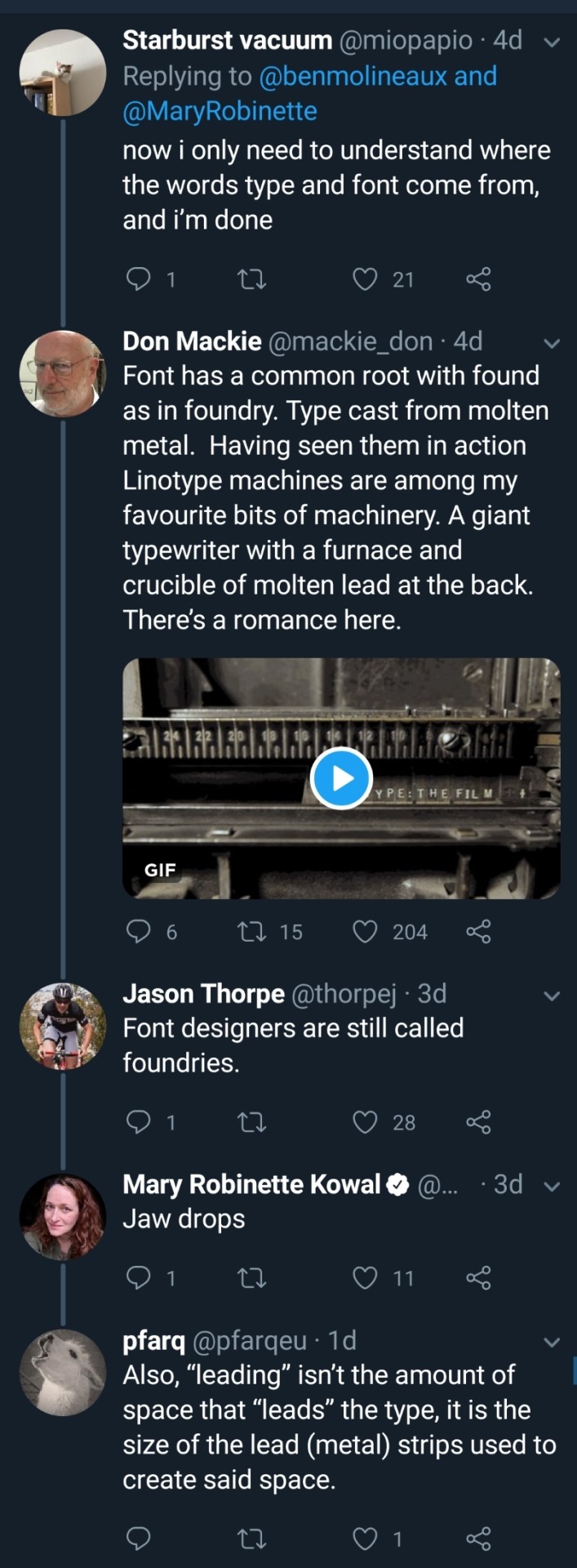

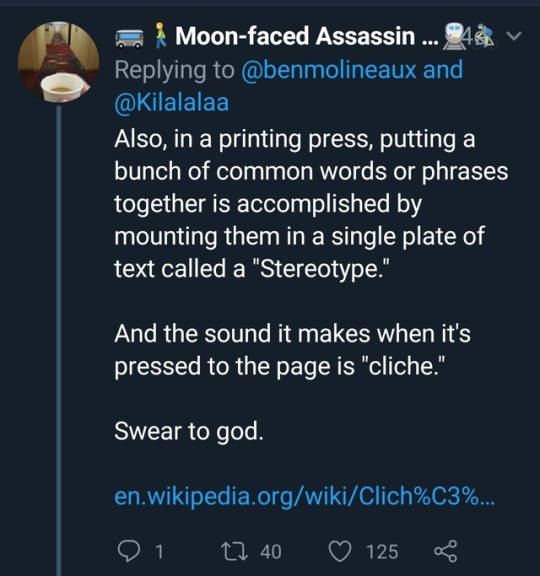
TiL (click to go to the thread, which probably has more interesting tidbits I missed).
Bonus:

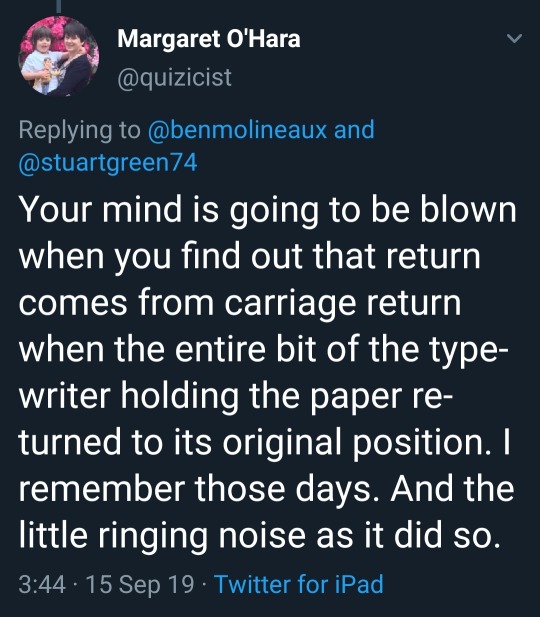
137K notes
·
View notes
Text
“To me, the core of that attraction is that she is a better reporter than he is. Think about being Superman for a second. The Olympic record for weightlifting is 1,038 lbs., but you could lift more than that as a child. The record for the 100 meter dash is 9.58 seconds, but you can travel over 51 miles in that time. Going to Vegas? You don’t need your X-Ray vision to win at Blackjack, because you can just count the cards while holding down a conversation about nuclear physics. Without really trying, you are better at just about everything than anyone else in the world. However, (as Mark Waid once pointed out in a podcast with Marv Wolfman) none of that really translates to your chosen profession. Typing really fast does not help your prose. Being able to lift a tank does not help you convince a source to go on record. It is as near to competing straight up with normal people as Superman would ever be capable of. Even then, it comes easily enough to him that you get a pretty lofty perch at a great paper very early in your career. It is just in this one context, there is someone better than you are: Lois Lane. As mild-mannered reporter Clark Kent, you reach up for the first time in your life and she rejects you. To me, it is an inversion of the Luthor story. Luthor sees someone above him and feels hate. Superman sees someone above him and feels love.”
— Dean Hacker, comment on “Giving Lois Lane A Second Look, For The First Time” by Kelly Thompson (CBR: She Has No Head!)
13K notes
·
View notes
Text
really recommend getting a partner with a different religion than you and very little knowledge of your religion because the opportunities for explaining things to each other are just exquisite
#religious history#christianity#jesus#mary magdalene#fascinating#christian mythos#best of#marriage#bce
71K notes
·
View notes
Text
The last star of the silent film era died yesterday at 101.
Diana Serra Cary started in films when she was 19 months old, as “Baby Peggy.” Like a lot of other child stars she was exploited, overworked, supported her entire family with her earnings, was considered “washed up” before she was 10 and was left with nothing as an adult. At 17 she ran away from home, knowing that her parents wanted her to work in films forever and she needed a way out.
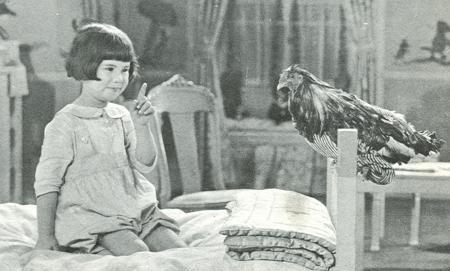
She eventually married an artist, opened a bookstore, and became an author and historian. Her 1978 nonfiction book Hollywood’s Children traced the exploitation of child actors from the 1800s onward.
She also released Whatever Happened to Baby Peggy? a memoir of her child star years, pulling no punches on the abuse she suffered at the hands of her parents, directors and studios, who put her to work eight hours a day, six days a week and had her doing her own stunts before she was five. This scene here, from The Darling of New York? Not special effects. They actually put this small child in a burning room and she almost didn’t get out because they accidentally fired all the doors and windows.
In 2011 a documentary about her, The Elephant in the Room, was released. She released her last book, a novel, at the age of 100.
She never got a star on the Hollywood Walk of Fame. She’s not remembered much in film histories. But she was one of the pioneers, and with her, the last of the silent era stars is gone.
29K notes
·
View notes
Text
Here's THE masterpost of free and full adaptations, by which I mean that it's a post made by the master.
Anthony and Cleopatra: here's the BBC version, here's a 2017 version.
As you like it: you'll find here an outdoor stage adaptation and here the BBC version. Here's Kenneth Brannagh's 2006 one.
Coriolanus: Here's a college play, here's the 1984 telefilm, here's the 2014 one with tom hiddleston. Here's the Ralph Fiennes 2011 one.
Cymbelline: Here's the 2014 one.
Hamlet: the 1948 Laurence Olivier one is here. The 1964 russian version is here and the 1964 american version is here. The 1964 Broadway production is here, the 1969 Williamson-Parfitt-Hopkins one is there, and the 1980 version is here. Here are part 1 and 2 of the 1990 BBC adaptation, the Kenneth Branagh 1996 Hamlet is here, the 2000 Ethan Hawke one is here. 2009 Tennant's here. And have the 2018 Almeida version here. On a sidenote, here's A Midwinter's Tale, about a man trying to make Hamlet. Andrew Scott's Hamlet is here.
Henry IV: part 1 and part 2 of the BBC 1989 version. And here's part 1 of a corwall school version.
Henry V: Laurence Olivier (who would have guessed) 1944 version. The 1989 Branagh version here. The BBC version is here.
Julius Caesar: here's the 1979 BBC adaptation, here the 1970 John Gielgud one. A theater Live from the late 2010's here.
King Lear: Laurence Olivier once again plays in here. And Gregory Kozintsev, who was I think in charge of the russian hamlet, has a king lear here. The 1975 BBC version is here. The Royal Shakespeare Compagny's 2008 version is here. The 1974 version with James Earl Jones is here. The 1953 Orson Wells one is here.
Macbeth: Here's the 1948 one, there the 1955 Joe McBeth. Here's the 1961 one with Sean Connery, and the 1966 BBC version is here. The 1969 radio one with Ian McKellen and Judi Dench is here, here's the 1971 by Roman Polanski, with spanish subtitles. The 1988 BBC one with portugese subtitles, and here the 2001 one). Here's Scotland, PA, the 2001 modern retelling. Rave Macbeth for anyone interested is here. And 2017 brings you this.
Measure for Measure: BBC version here. Hugo Weaving here.
The Merchant of Venice: here's a stage version, here's the 1980 movie, here the 1973 Lawrence Olivier movie, here's the 2004 movie with Al Pacino. The 2001 movie is here.
The Merry Wives of Windsor: the Royal Shakespeare Compagny gives you this movie.
A Midsummer Night's Dream: have this sponsored by the City of Columbia, and here the BBC version. Have the 1986 Duncan-Jennings version here. 2019 Live Theater version? Have it here!
Much Ado About Nothing: Here is the kenneth branagh version and here the Tennant and Tate 2011 version. Here's the 1984 version.
Othello: A Massachussets Performance here, the 2001 movie her is the Orson Wells movie with portuguese subtitles theree, and a fifteen minutes long lego adaptation here. THen if you want more good ole reliable you've got the BBC version here and there.
Richard II: here is the BBC version. If you want a more meta approach, here's the commentary for the Tennant version. 1997 one here.
Richard III: here's the 1955 one with Laurence Olivier. The 1995 one with Ian McKellen is no longer available at the previous link but I found it HERE.
Romeo and Juliet: here's the 1988 BBC version. Here's a stage production. 1954 brings you this. The french musical with english subtitles is here!
The Taming of the Shrew: the 1980 BBC version here and the 1988 one is here, sorry for the prior confusion. The 1929 version here, some Ontario stuff here, and here is the 1967 one with Richard Burton and Elizabeth Taylor. This one is the Shakespeare Retold modern retelling.
The Tempest: the 1979 one is here, the 2010 is here. Here is the 1988 one. Theater Live did a show of it in the late 2010's too.
Timon of Athens: here is the 1981 movie with Jonathan Pryce,
Troilus and Cressida can be found here
Titus Andronicus: the 1999 movie with Anthony Hopkins here
Twelfth night: here for the BBC, here for the 1970 version with Alec Guinness, Joan Plowright and Ralph Richardson.
Two Gentlemen of Verona: have the 2018 one here. The BBC version is here.
The Winter's Tale: the BBC version is here
Please do contribute if you find more. This is far from exhaustive.
(also look up the original post from time to time for more plays)
56K notes
·
View notes
Text
Okay I’m feeling kind of ranty about this still so I want to take this opportunity to talk about narrative therapy, kink, and fanfiction.
Narrative therapy is a form of therapy that allows people to process trauma through the slight removal and distance of story. Some griefs and pains are so huge that even trying to process them can be overwhelming. Using the slight distance created by talking about traumas instead through storytelling allows people the ability to process difficult emotions easier.
This is why tragedy as a genre exists! The point of tragedy is catharsis, feeling a powerful devastating emotion in its entirety letting it wash through you and then pass. Opening ourselves to our own griefs can be unbearable, so we as a species find it easier to process them through characters.
Narrative therapy allows people to write and rewrite their own life story. They can change events that happen, or they can just find some measure of closure in processing something through metaphor. It can restore a sense of control over a life event that ripped away someone’s sense of self.
It is fairly obvious that a lot if not most people, especially when first starting in the art form, write fanfiction as an intuitive form of self directed narrative therapy. People love to project their insecurities and fears and experiences and traumas onto their blorbos.
Bad things happen to people. No one gets out of life alive. Some people experience the worst things imaginable and live to tell the tale. And sometimes those people process their traumas through creating fanart and fanfiction.
If art that depicts terrible terrible things like sexual assaults isn’t allowed to exist, then the people who have lived through them are forbidden from talking about their lived experiences. Isolated. Their very existence a taboo subject. People Need to be able to talk about their experiences, and survivors deserve to be able to make or consume art that reflects their life without being told they’re no better than whoever harmed them.
Now! That is not to say that everyone who consumes or makes erotica about a taboo subject has to have experienced that thing. Sexual fantasy is complicated and human brains are weird. But having sexual fantasies about a taboo subject is NOT the same thing as doing those actions in real life and many people fantasize about stuff that they have Absolutely no interest in actually doing. But trying to police sexual fantasies just harms people’s experience of self!
Kink is not inherently evil! Kink is just roleplaying!!! Many common kinks are reflections of larger cultural anxieties. For example, people socialized as women are taught to always fear sexual assault. Is it any wonder that so many have a cnc kink? Kinkplay or cnc erotica allow people to experience the feeling of a complete loss of control and process that in a safe way that they actually have complete control over.
Societies dominated by repressive religious morals already tend to result in people having unhealthy relationships with their own sexuality. Cultural norms around sexual purity do a number on people. I think a fascinating example of this is the girl defined sister who has actually started talking openly about how religious indoctrination about sexual purity almost destroyed her marriage (while still maintaining that sexual purity is important. Of course. Because the cognitive dissonance is strong). The saddest example of this I have seen is teens on tiktok self policing their sexual expression to the point of feeling bad for having a crush on a character their own age.
The answer to systemic sexual violence is not banning people from ever talking about it or making art featuring it. The answer is better education and social norms about consent and bodily autonomy, and a normalization of discussing difficult and complex subjects, and addressing environmental pre conditions and abuses of institutional power. It is not policing all sexual expression to make sure it is morally pure.
Anyway all this to say I stand by my universal theory that:
fanfiction 🤝 kinkplay 🤝 RPGs 🤝 narrative therapy
And please stop regurgitating christofash rhetoric about sexual and moral purity while complaining about art you find gross and telling people to kill themselves for having a slightly edgy ship. You are not preventing harm, you are doing harm.
752 notes
·
View notes
Text
Feminist fantasy is funny sometimes in how much it wants to shit on femininity for no goddamned reason. Like the whole “skirts are tools of the patriarchy made to cripple women into immobility, breeches are much better” thing.
(Let’s get it straight: Most societies over history have defaulted to skirts for everyone because you don’t have to take anything off to relieve yourself, you just have to squat down or lift your skirts and go. The main advantage of bifurcated garments is they make it easier to ride horses. But Western men wear pants so women wearing pants has become ~the universal symbol of gender equality~)
The book I’m reading literally just had its medievalesque heroine declare that peasant women wear breeches to work in the field because “You can’t swing a scythe in a skirt!”
Hm yes story checks out

peasant women definitely never did farm labour in skirts
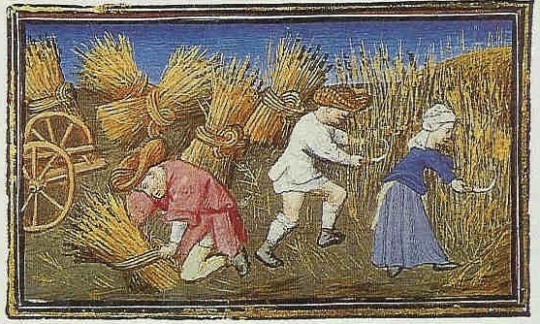
skirts definitely mean you’re weak and fragile and can’t accomplish anything
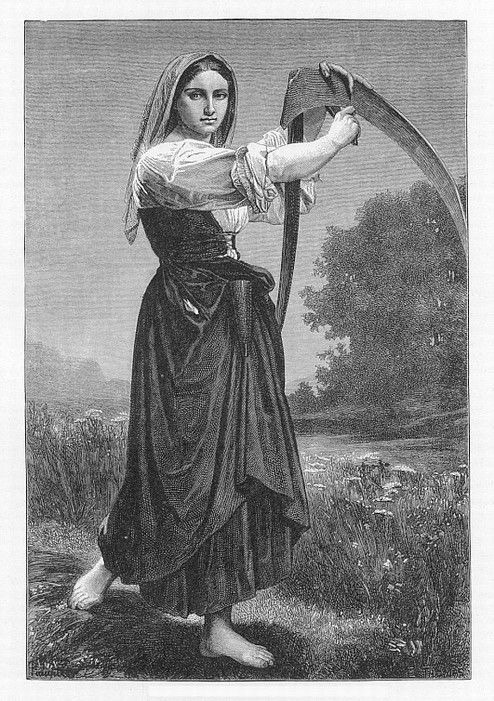
skirts are definitely bad and will keep you from truly living life
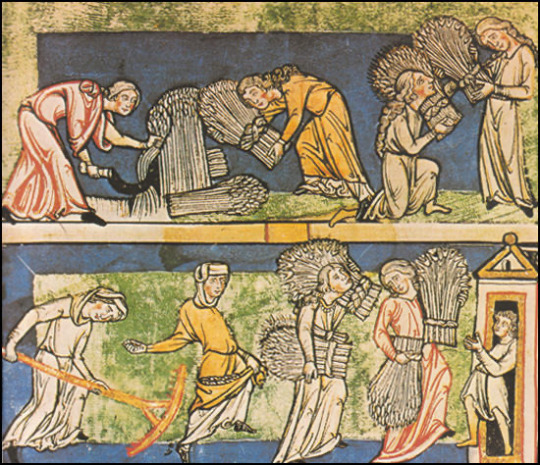
no skirts for anyone, that’s definitely the moral of the story here
93K notes
·
View notes
Note
heyy this might be a LONG post but I was just wondering if you could tell me what's wrong with harry potter in overall? like, the mauraders' era, jkr's worldbuilding, severus snape, the unacknowledged grey areas, the red flags that are ignored. I think you're one of the best analysers of harry potter and actually give evidence to support what you say. thank you!!
Hi there!
There are many aspects I really like about the HP books. I think some of the ideas and concepts are genius. I really think what JKR did with the ‘magic’ of love and friendship and with the selfishness of the hunger for power and immortality is really very good. I think that the horcruxes were a brilliant idea. As are the patronusses, the dementors, the concept of the unforgivable, of how intent comes into it etc.
I also would say that she has invented great and interesting characters. Characters whose flaws drive the plot. Harry’s saviour complex that drives him to try to safe Sirius for example, Ron’s uncertainty that makes him leave Harry and his friendship twice, Hermione’s rationality that is an asset but occasionally also a hindrance (like when she doesn’t take Luna serious at first). There are some very likeable characters. Neville and Luna are my favs. I think Dumbledore and Snape are very interesting and even compelling characters (although I do not like them very much).
Then there is the fact that she wrote how the specific brand of classism she invented for HP (pureblood vs. muggles and muggleborn) is present throughout the entire society. There is the extreme end of the people who want muggleborns to be no better than muggles but there are also the so-called tolerant people that still have a condescending attitude towards the people that they think are inferior. I think it is actually an acute and interesting observation.
So, besides all my misgivings about JKR I find her world very interesting to explore and play with. I basically write HP fanfiction to address some of the things that are never addressed in canon - like the ever present prejudice against muggles and muggleborns and things like that.
The main problem with her characters and the classism in wizarding society is that it might be a good set-up, but it is not written as such. And that is actually where the problems start. And since this is quite a lot I put it under the cut.
You know all the grey characters should be acknowledged as such, but they are not. Harry is basically a good character, but he has his flaws and Hermione can be so focused on her ends that she can be downright vicious (and ruthless). Draco Malfoy stays a bad character, and the one time when he actually shows a conscience and refrains from killing, JKR says it’s cowardice. (sry, not sry, JKR, choosing not to kill Dumbledore to save himself and his mother is not cowardice). Harry uses unforgivables in his quest to destroy Voldemort (and I don’t blame him for it, but it should be addressed not just told and brushed off). The pranks of the Weasley twins are questionable to say the least. The characters are presented and talked about as ‘good’ vs. ‘evil’ and yet they are all grey (and actually interesting for that reason).
Then there is the fact that by the end of the book only the very extreme classists are defeated and otherwise “Everything was well”. No, JKR, it is not all well. Harry, Hermione and Ron basically become part of the system! Again it could have been written as a really thorough analysis of how classism shapes the whole society, how extremists are enabled by the unspoken bias, how it is even a struggle after the extremists have been defeated. But the way is it written it actually gives the impression that there is something like a ‘good classist society’. Harry is basically the good English aristocrat. You know the kind of English nobleman who inspires the loyalty of his butler, who is nice to the working class. Someone who shows that the system works if its just the right people who are at the top. I don’t think that is the right message.
So, she describes a grey world, but explicitly things are only black and white. The deeds of the Gryffindors are good, the deeds of the Slytherins are bad.
Another thing that somehow does not sit right with me is the way JKR handles paralles and tropes. I still think that Draco could have been made into an excellent parallel of Regulus (and that Dramione could have been an excellent parallel to Severus / Lily in the marauder’s area). Of course there is no obligation to fulfill tropes, but it would have been a possibility. And I just have the feeling that she does not handle tropes that well. Take the ‘statute of secrecy’. That is actually a huge Checkov’s gun imho. And it is never fired. Crookshanks is set up to be special - and nothing ever comes of it.
Then there is the whole problem with “tell, don’t show” and the character who is affected the most by this is James Potter. We never see James doing nice things (imho preventing Snape from being killed by his friend after he was set up to be murdered could have been a major turning point for James, but he doesn’t change his behaviour afterwards). He could have had a redemption arc, but he doesn’t get one. We are just told about this. James is an entitled prat, rich, arrogant and from what we see of him, he is completely unlikeable, but we are told that he is cool and good, just because he joined the order. We actually see Sirius and Remus doing some good stuff at least, but James is completely unsatisfactory (and I honestly don’t get the whole marauders’ hype). I believe I would have absolutely hated that gang of boys if I had been to the same school.
Another problem is that some of the characters are just too cliché. I would argue that Hermione is a bit more than “not like other girls”, but Ginny clearly is. Fleur and Lavender are the feminine girls who are painted as vain and stupid (and Pansy is mean on top). I probably shouldn’t even begin with how Cho Chang is depicted, because not only did JKR made no effort with her name, she also fits right into clichés. And JKR hates ‘girly girls’. Her feminism is not inclusive. Considering when she wrote it is still good that she has so many and different female characters though and one thing that seems to be o.k. in the wizarding world is that I don’t get many sexism vibes (apart from the cliché girly girls)
There are also anti-Irish stereotypes. Seamus Finnigan blows everything up, and sort of the Irish coded Weasleys are red-haired, freckled, poor and disregard authority (apart from Percy who is the typical social climber).
Then there are the Goblins whose description is rich in antisemitic codes. Greedy moneylenders, unreliable, hawk nosed....
Severus Snape also ticks some boxes for antisemitism. Black hair, moody, hawk nosed, not really part of society, intelligent and clever, but never belonging, an outsider, not a ‘gentleman’ (like Harry is).
Then don’t let me get started on the elves! They like to be slaves. They like to be slaves. Again. They like to be slaves. How is that not fucked up.
Another point is lazy world-building. If you have one school for Britain and one for France, and one for Scandinavia, why not two for Germany and Switzerland, why not at least 5 for the USA, China should have 30 schools. Let it make sense. I sometimes wish JKR would have just admitted, that she just thought about Britain and that she has no idea how the rest of the world handles the education of wizards and witches. Why not let her fans fill the gaps?
Then there is also the fact that she couldn’t commit even to the one character she actively admitted that he is grey: Severus Snape. I do think that she concentrated so hard on having the readers doubt his loyalty - which is definitely one of the major plot points of the series, if not the major plot twist, that she did not make enough of an effort to let it make sense. We learn a lot about Severus Snape but we do not learn why he joined the death eaters. We learn that he saw it as a mistake later and tried to atone but we don’t know what reason made him do it. Did he want to be protected? Did he thirst for knowledge? Did he as a halfblood really believe in pureblood ideas?
The other thing is also that the doubt about Severus Snape’s loyalty is so important that other characters suffer for it.
There is only one thing, I don’t really blame JKR for. The fact that Dumbledore is gay and that she did not write that explicitly. At the time she wrote, childrens books were actually forbidden to have openly homosexual characters. She had to write Dumbledore as a closeted gay or she would have had to relabel her books. This is actually one decision I don not lay at her door.
But as you see there are plenty of things I had to say. You are welcome to ask about some of the aspects in detail (and that would probably induce me to another rant).
Sorry, it took me so long to answer. I had a rather busy time!
Thanks for the ask!
73 notes
·
View notes
Text
I teach a lot of undergrads these days. About 3 years ago, I started dedicating a full two hours early every semester to a lecture and discussion about the history of the concept of plagiarism, because I was so annoyed that my students were walking into my classroom with the ironclad belief that they weren't plagiarizing when they were. Sure, the university had some official plagiarism guidelines that they could hypothetically read in a code of conduct somewhere, but they didn't. All they had was a vague memory of some teacher in Grade 8 telling them 'don't copy and paste from wikipedia' and a little learning from experience afterwards.
My hypothesis (which I was delighted to find is shared by Brian Deer, the journalist who broke the Wakefield story and who was the source Illuminaughti plagiarized in the hbomberguy video) is that the rise of automatic plagiarism checkers meant that, in the minds of many students, the formerly more abstract concept of plagiarism ('passing someone else's work off as your own') became a more concrete concept operationalized by the plagiarism checker. Under this concept, a text is plagiarized if (and, implicitly, only if) it is detected as plagiarism by the plagiarism checker. I have spent many hours with students sobbing in my office after I told them that their essays were plagiarized, and they all say that they thought changing the words around was sufficient to make it not plagiarized. Maybe some of them were lying for sympathy, maybe they all were, but I see no reason to not take them at their word. They think that what they're doing is dubious (hence the shame) but they don't think it falls under what they take to be the definition of plagiarism - the thing they can face sanction from the university for. They need to have it pointed out to them that there has been plagiarism for a lot longer than there have been automatic 'plagiarism checkers' and that as their professor, I'm the only plagiarism checker they really need to be concerned about.
It's really easy for me to get frustrated about this. It's frustrating to me that the American public high school system (the source of the majority of my students) has failed to prepare them to think about information, facts, and where they come from. It's frustrating that students can't be arsed to read the university's code of conduct and that the only way I know they have is if I read it straight to their faces. It's very frustrating to see the written scholarly word, a medium to which I have dedicated no small part of my life, treated like it's not worth anything. I'm frustrated to know that most students are not in my class, or in the class of someone else prepared to teach this lesson, so they'll go through their whole lives thinking that an uncited light paraphrase is enough to be worthy of credit. I'm frustrated that people with such a lax attitude towards information are my fellow voters. I once read a real fucking academic essay that was submitted for grades that cited a long quote from Arthur Conan Doyle that, when I traced it, was actually a quote from a fucking TJLC blog. That one isn't frustrating, I guess, that's just funny. It's not all bad.
I'm glad for the hbomberguy video. I hope it will make it easier to convince my students in future. It's too bad he didn't go into the academic context, but it's not like he was short on things to talk about already.
But this is a more general problem than just the video essay context shows. If we're not careful, the very concept of plagiarism can get eroded. I'm not a linguistic prescriptivist, either! If enough people start taking this new concept as plagiarism, that will be what it becomes. I think a world in which that notion of plagiarism is the relevant one would be a worse world. Don't let people erode the idea of credit. You're going to want it later.
26K notes
·
View notes
Text
I feel like many people have a fundamental misconception of what unreliable narrator means. It's simply a narrative vehicle not a character flaw, a sign that the character is a bad person. There are also many different types of unreliable narrators in fiction. Being an unreliable narrator doesn't necessarily mean that the character is 'wrong', it definitely doesn't mean that they're wrong about everything even if some aspects in their story are inaccurate, and only some unreliable narrators actively and consciously lie. Stories that have unreliable narrators also tend to deal with perception and memory and they often don't even have one objective truth, just different versions. It reflects real life where we know human memory is highly unreliable and vague and people can interpret same events very differently
27K notes
·
View notes
Text
When I took my literary criticism theory class in undergrad the professor told us that in modern literary criticism “The author isn’t dead but they are a ghost breathing down your neck”
Basically, the old way of thinking was that the point of literary criticism was to find the true original intentions of the author. Then death of the author was introduced and literary criticism swung hard the other way, saying that what the author thinks and the context they were in doesn’t matter.
Nowadays, it’s somewhere in between. Yes the author had intentions and yes the work had context. But the work also has context right now and a history of people reading it and interpreting it and sometimes an author puts meaning in something that they didn’t realize they were.
I can’t sit down and interview Jane Austin about every little decision she made in Pride and Prejudice but I can look at what we know about her life and the era and place she lived in. I can also ignore all that and look at what the book means right now to modern people. I can compare Austin to writers in her own time as well as writers now. I can speculate on what I think was on purpose and what wasn’t.
A lot of people go on about death of the author like that’s the only correct way to interpret fiction when modern lit crit moved past it years ago. Reading critically is a conversation between the author, the reader, and the various contexts surrounding both of them. Nothing exists in a vacuum but at the same time nobody can anticipate every interpretation their work might present with.
The question of analysis and separating art from artist isn’t a simple cut and dry issue. It never has been and it never will be.
3K notes
·
View notes
Text
I’m not sure exactly how to articulate it but—there is this bizarre base assumption i see from people discoursing about children’s media, and that’s the assumption that children are somehow unfamiliar with negative emotions. Like, maybe you’ve managed to completely forget your entire life before you turned eighteen, but kids spend a lot of time being hurt, and scared, and angry. A lot of people had terrible fucking childhoods, and a lot of kids are having terrible fucking childhoods right now. When i was a child, and i read books where bad things happened to kids, that was in no way shocking to me, i already knew bad things happened to children. It made me feel more connected to those stories, not less, and it made it more impactful when those child characters overcame it all in the end. That’s important for children. A lot of them are in desperate need of a little hope, and they aren’t going to get it from nothing stories with no conflict. They put conflict in children’s media for a reason
Also i see some of you handwringing over child protagonists going through, like, the most basic hero’s journey. Please, for the love of god, realize that you as an adult are going to understand children’s media differently than the actual kids it’s intended for. Because you’re all grown up now, you aren’t going to be able to relate to a child protagonist. You’re going to see a child in danger. The children the story is meant for are going to see a kid like them who is able to face hardship and triumph
16K notes
·
View notes
Text
Notes on John Gardner's The Art of Fiction 1983
Content Warning: Borders on racist to outright racist in an accidental way. Quietly sexist too.
I should note that after a while, you get used to doing the following with white straight men's writing advice manuals:
Count the men authors. Compare it to the women authors. Compare how much the male authors get time in the book with analyses and thought about them compared to the women.
Count the queer authors. Replace the previous bullet point with straight and queer.
Count the PoC authors. Count White v. PoC.
Count how many times they drop Shakespeare and Aristotle. Count how many times they misunderstand Shakespeare and Aristotle.
Count missing attributions.
Count up straight sexism and racism and squint really hard at if it was intentional, or they just weren't thinking that heavily at the time.
Then you get a tally.
And usually the structuralists for things like plot, etc lose big time on this. And sometimes I wish I was wrong and they wouldn't do this so you can't make a drinking game out of it, but I don't know what the temptation is with the books before 2000 to keep doing this. And back tracking their citations and diagrams is a pain in the butt. I mean I know we lose things, and they didn't have the internet, but damn. Seriously?
I'm sorry to report there are issues with this writing advice manual that cover the bullet points.
And the thing is while he cites fiction, he doesn't cite other writing manuals, which would come to the fore when he basically steals from get this... Kenneth Rowe. "I can't remember where I got this diagram from." Dude, it's Kenneth Rowe's sad little contributions as he plagiarized from two other authors. Sad irony, maybe? Kenneth Rowe, my dude, if you'd only cited things as an author maybe people would cite you back and you wouldn't get this sad irony. The thing is that the authors that plagiarized get plagiarized from more. Is it karma? Or is it FA&FO?
That said, on the upside, he does cite more than one structure, but he still sides with the conflict narrative, which turns tragic later in his book around page 205.
Let the Games Commence
Do you want to make bets on the usual item lists?
Count the men authors. Compare it to the women authors. Compare how much the male authors get time in the book with analyses and thought about them compared to the women.
Amazing. Six white women authors. Gertrude Stein, Eudora Welty, Flannery O'Connor, Isak Dinesen, Nathalie Sarraute, Virginia Woolf. Clap, damn you, he got 6. And one has a male-sounding name, Isak Dinesan, is why the analyses her more deeply than the others who only get cursory mention--see, I have a theory he read her completely by accident and then found out she was female later (It was the 80's, no internet, so could be accidentally inclusive). I guess that sounds jaded. And 2 of the 5 are queer. (Sapphist, if you will) https://www.penguin.co.uk/articles/2021/02/virginia-woolf-vita-sackville-west-letters-love-affair

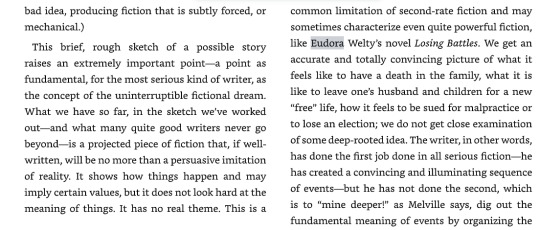
page 191

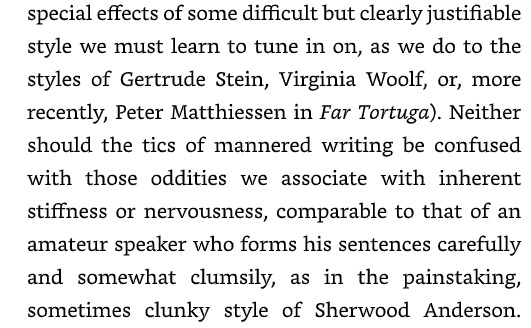
p 130-131
Gertrude Stein is a lesbian, and worth mentioning because of the contribution to Modernism. But credit isn't given here to specifically that. It's given slantly:
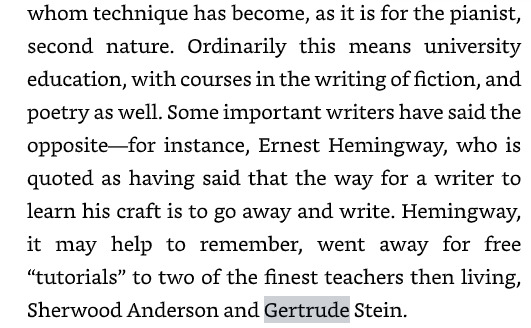
The analyses are much shorter compared to men, who get whole passages cited from them (I'm grumbling about the lack of page numbers here.) However, I do have to give it Gardner that he's a bit more efficient with his texts and naming his peers on command than most. I'd prefer complete citations or at least partial such as, Anne of Green Gables, Page 1, by LM Montgomery even if one doesn't know the date, one should have the rough page number to go by if you're quoting entire passages.
I do have to also hand it to him, that while he can't seem to analyze women's writing in any kind of depth he doesn't disparage them as many of the people before him did.
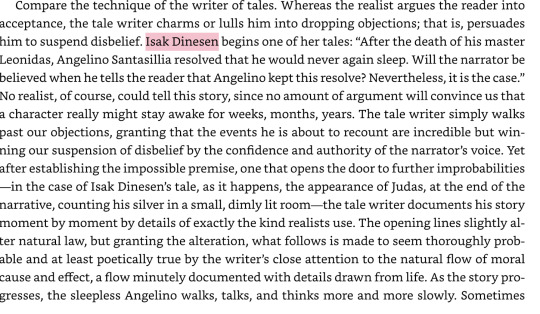
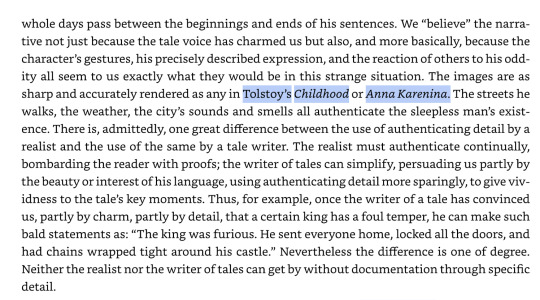
So, female author, writes male character, get an analysis in the book, but also has a name that's not recognizably female. Got ya, right. So him mentioning 5? women writers makes him totttallllyyy not sexist and he needs praise for this.
But in the space of 2 pages he manages to mention what? 5 male authors versus five female authors for the entire book. Don't you see the problem with this? If you think women are going to overhtrow your arguments for how to write, maybe you should reconsider your arguments on story theory so they aren't sexist? Maybe look at why the modernists were popular with marginalized groups and oppressed groups, especially if you mention queer white women more than once, but can't bother to analyse their work through a feminist critique lens. I know, right, crazy idea here.
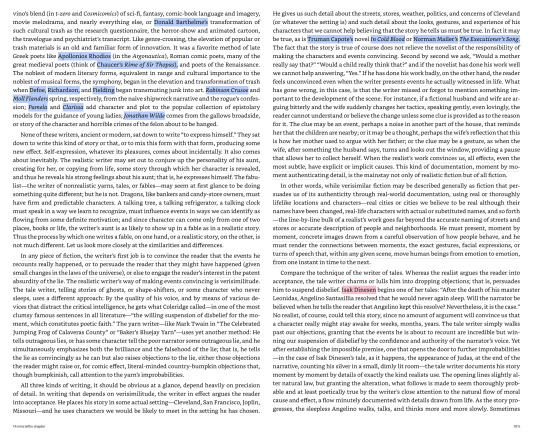
TT Counting the men compared to the women and listing them all just breaks your heart. He fails this spectacularly. But he's better than some of the other authors I've analyzed who go on to plain disparage women writers as being inferior overall in not-so-subtle ways.
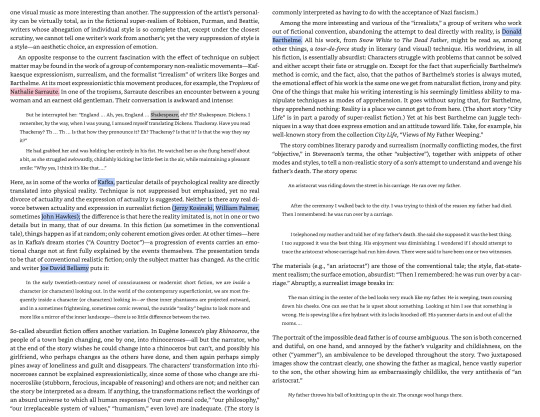
I might have missed some, but the way he mentions these women in context gives me a headache (Look Gertrude Stein contributed to Matisse... Look, I finally mentioned a woman but am going to deluge you with five or more other white men.)
BTW, it's Donald Barthelme Jr.
Count the queer authors. Replace the previous bullet point with straight and queer.
Samuel Delaney to add to the other two. The way Samuel R Delaney is mentioned kinda doesn't sit right with me, though... so I'll save that for the WTF territory. I checked the other male authors. All of them are straight. TT Kindle lets me highlight and I can check.
Count the PoC authors. Count White v. PoC.
He got 2 PoC authors? Both male, BTW. Neither get deep analysis and both references are kinda WTF territory as if saying they are inferior. One Japanese man. One Black Man. TT I had a sliver of hope that the Japanese man might be a woman despite the name, because that happens, but no.
Count how many times they drop Shakespeare and Aristotle. Count how many times they misunderstand Shakespeare and Aristotle.
Drops in Shakespeare 26 times.
Wrong references...

No, the story driver is morality, which is well, well argued. But I go into that more later, plus his terrible speculation on an author that didn't write about his own works. I have plenty about that in my youtube series.
Most of the mentions of Shakespeare are to name drop how great he is and to boast how well Gardner knows about Shakespeare, without showing how well he knows Shakespeare. TT I'm getting Freytag flashbacks. (Truly, reading that thing scarred me for a while espcially after I figured out why he was so middle class, etc)
The thing not captured in all this discussion of Shakespeare is how how often people forget that the point of Shakespeare was to appeal to the public of the time, not to make stuffy literature with a stiff upper lip (which comes later in history), so all of this mindless worship without really understanding that the context wasn't for stuffy lit professors maybe 400-500 years later, it was to be a popular playwright.
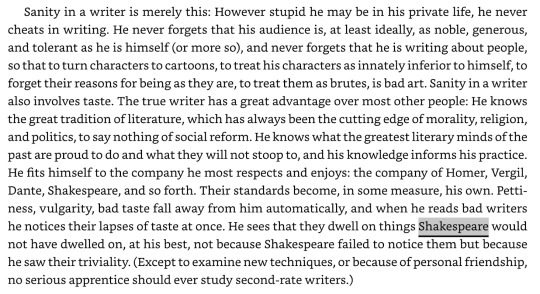
I'm begging you to stop doing this to poor Shakspeare. Trying to make a fictional guess at an author who wrote nothing about treaties of writing.
So factually wrong once which I'll go over later. Two times of overspeculation so he can sound better. And the rest of it sounds like blind worship. He did get the summary of Hamlet correct, which is better than Rowe (who was a Shakespeare specialist. Am I going to make fun of this for the rest of time? Yes.) and definitely better than Freytag, who lamented that Shakespeare didn't have a blue box and didn't use his story structure. I'm joking about the blue box, not the rest of it.
Aristotle
Total count: 11

Wrong. Aristotle solidly argued for morality with negative reinforcement. But you can see more about white men's temptation to use foreign words to sound smart while missing the point of the text in the somehow hilarious double example of this: Aelius Donatus.
FINISH READING POETICS. STOP CHERRY PICKING. And read it in the way Greek arguments were meant to be read.

Overstatement and wrong.
Aristotle didn't give a rat's ass if it was satisfying. He wanted negative reinforcement of morality. It was supposed to be uncomfortable for the viewer to confirm how they were living was the correct one, which is why the majority of the plays of the time were down with the Spartans type of style. Se, Historicism does you good. Understand the text in its context as well as your readercism and your media literacy goes up ten fold. You no longer see Antigone as a sad jaunt of her trying to bury her dead father, but a moralistic tale about the position of women in society and how it goes all to wrack and ruin to reinforce Athenian society.

No citation? Where is it? Because I don't remember him saying anything of the sort and I combed through that thing and quoted it to death.
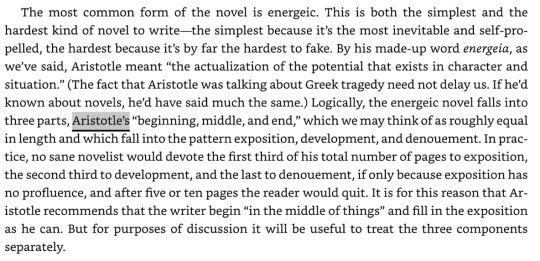
I solidly argued this is wrong and a wrong way to understand Aristotle's treaty, Poetics. He directly contradicts this several times. Including the 16 part and 2 act play: Good and then everything goes to shit. Unlike here, I did it with page numbers and direct quotes you can check.
Remember, final arguments in Greek arguments come at the END of the paragraph because the five-paragraph essay was not invented until the 19th century. And in most morality-type plays and stories, the moral always, always comes at the end, not at the beginning. Sometimes it's the beginning and then reexamined at the end, but worldwide, it's mostly at the end. Since the Greeks, particularly Athenians were all about morality, most of his theses come at the END, not the beginning. This main point in that section was that the play had to be what? CONTINUOUS, fluid and simple. It was not about the act structure of the play, but more that hings need to go in sequential order and be simple. Read it carefully and try again. Clayton Hamilton, Freytag, Rowe, and Gardner all read the text wrong. This is why you need to read the complete text to get the treaties, otherwise you miss stuff, like Rowe is an incompetent plagiarizing hack, or that Freytag really, really is racist and this does influence how you think of their treaties because then you start asking: Is this treaties incomplete because they did not read or think widely anough before they typed up this theory? Therefore, what are the weaknesses and how do I do better and get around it? i.e. more Media literacy.
The highest error rate is Aristotle in a Aristotle v. Shakespeare for Gardner here. Anything he says about Aristotle, I'd triple check on that.
Count missing attributions.
He has partial attribtions all over the place and then he also includes things he confesses he doesn't know where it was from and can't be bothered to look it up in the existing writing advice section of his library. (or *gasp* his bookshelf--remember, 1980's)
He's missing on Rowe, whom he fails to remember correctly, but copies the diagrams almost one for one. And while this isn't a history of writing theory--anything that is attributed to women he largely skips over in the text with any good jobs, while he bends over backwards for that with men, going as far as often to put in textual analyses. Anything he's quoted from women are in reference to men. Damn. Fail on the Bechdel test, nonfiction style.
The ideas where he got the literary theory from are also missing along the way. Sometimes he'll say this or that person innovated this idea, but he often fails to cite where say this or that diagram comes from. And if I did that at university, I'd be given a lesser grade, but meh, white men in this manuals get to slide over everyone else.
Count up straight sexism and racism and squint really hard at if it was intentional, or they just weren't thinking that heavily at the time.
The sexism is harder to sort. The racism is insidious and much harder to sort. Nothing explicit, but there is a WTF, which I'll cover later.
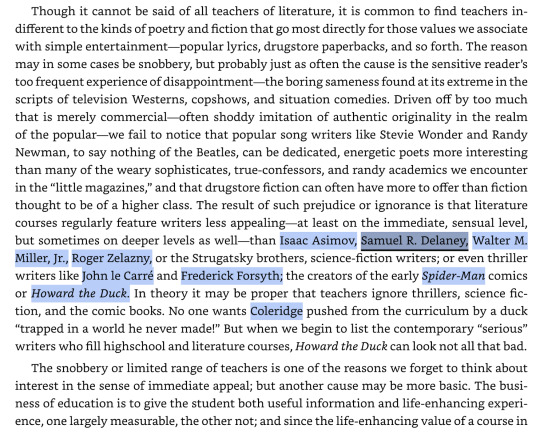
This rubs me wrong. This seems to misunderstand how classics are made, which is the argument he should be going for. "Higher class" and talking about mainstream fiction in this way on one hand, seems wrong, on the other, him mentioning a Black author for the first time in this context kinda feels odd. And it wasn't like he could miss Maya Angelou who seemed to be the only female Black author they could name in the 1980's. TT (I remember growing up in the US and they put her on almost every exam. I read about pineapples so many damned times, but they couldn't really teach the book or even mention where the excerpt was from.)
The later racism is weird. And I don't know what to make of it.
Scale from Technique to Structuralist
If Technique is 1 and Structuralism is 10, I think Gardner lies somewhere around 7-8? He leans more heavily towards structuralism, but he can't abandon some of the ideas that personalized technique and reading widely will serve the average writer. Despite this, he does fall into some pit traps that come into the next section.
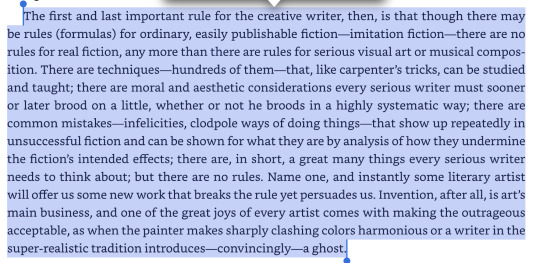
This is an argument for technique. But there are hints of structuralism later on.
Modernist v. Structuralist
Modernist
Plain Wrong

page 10
Why is this wrong?
The thing is the focus on character versus Plot is more of a thing that came out of the late 19th century debates about the "Great Man Theory" (Which I've covered prior to this)
This persists in the debate around character-driven and plot-driven. But it's a load of crock which was abandoned in the 1980's by historians and then picked up by writers in the same time period. (I suppose you can see Gardner buying into this).
But there is a strong counter argument by Lucy Worsley (a historian) that character-centric thinking wouldn't have been popular until late industrialization in documentaries such as A Very British Romance (in particular) and later A Very British Mystery.
This is also known by Anthropologists who trace the thoughts of individualism very much to neolocal thinking. (Which is kind of funny given how much he didn't research Anthropology given his example later in the book.
As covered elsewhere and ad nauseum by British Historians over and over again, Shakespeare was likely not aiming for character alone, but morality. In fact the main core of the To Be or Not to be thing is about morality. Thus, character is secondary for Shakespeare. Shakespeare *may* have great characters, but to argue in this way that characters came first is wrong.
I do have a huge thing about people attributing thoughts to people who didn't write their thoughts in detail or did, but were never translated or their texts are incomplete.
OK, did Gardner have access to the historians I cited? No. But you know, if he'd actually did the research on anthropology he might have found something fishy about making the whole of Shakespeare character-conflict driven (also if he'd bothered at any point to do citations backwards and find other writing manuals).
Yeah, yeah, someone is going to argue readercism, and I'm going to say Historicism should also be considered in the reading of Shakespeare. It's not about "superiority" but more that nuanced readings help media literacy. And while his is not a dissertation on Shakespeare, one can be careful to not over attribute things to an author and place false authorcism on someone without the evidence to back it up. You can state something like your personal take away is that Shakespeare is great at character without overstating that you think that Shakespeare put at the center of his plays great characters. Do you see the difference between true attribution and false attribution?
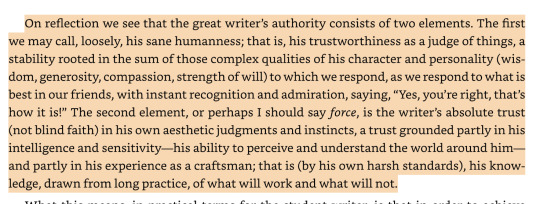
I disagree with this. But then I've read wider (as in more cultural bases) than he apparently has.
There is the anti-hero... and they aren't always likable as a character. You also have several genres invented in this time period that make it shady to state this, such as the noir novel. And Dystopian novels also often play with unlikable heroes.
And it's not fair to him, but rage novels also often play with heroes that come in shades of grey and WTF.
By this time too, Lolita was published, and if you think the main character is "best in our friends" and "admirable" you have issue you need to deal with--no, really, go se a therapist. Humans are odd in that we also will respond to delicious villains we want to hate and sometimes we root for the villains over the heroes, not always because of their good, but also for their bad.
The second one, I kind of half agree with Percy Lubbock on this one--while it is your own judgment, it's still a partnership between the author and the reader. It's not merely force. It's that point where you need to communicate the thing in efficiency, but the joy is in its consumption. This is a argument also for the limitations of authorcism and against hubris of the author. You are trying to agree with a certain reader that you will work together for an aim, but how you get there is often the question these writing theory books try to answer and never can quite come up with.
In fact, Gardner floats a question of how resonance is achieved, but doesn't seem to be able to know what the answer is--and in fact if we knew how to guess resonance, we'd be marketing geniuses. (Though my gap theory kinda gets closest I've seen in writer theories about resonance. But this is getting into psychological territory, I think.)
The previous paragraph is to be fair to Gardner since I'm showing he's not a hardliner as some of the other authors in the list of lists.
Aristotle he gets even more tragically wrong.
He asks people to read widely... (~page 14)
But then fails to show he's been doing it himself. Do as I say, but not as I do. As I said, he cites women, but then fails to analyze them deeply.
On John Steinbeck ~page 14.
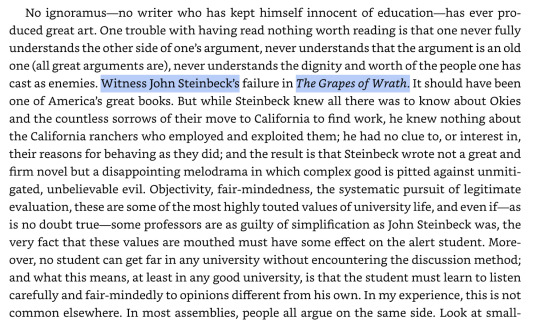
This one is weird. John Steinbeck is considered a classic now and has been widely taught in classrooms. The point of Grapes of Wrath is to take the side of the workers... that's the whole point. And to state outright that one thinks that he didn't do research, when several other statements in this manual turn out to also not been researched kinda feels iffy to me. If you're going to call out someone, without evidence, then at least do the rest of the book correctly and check to make sure you aren't doing the thing that you're accusing others of doing.
WTF Territory
CW: Racism
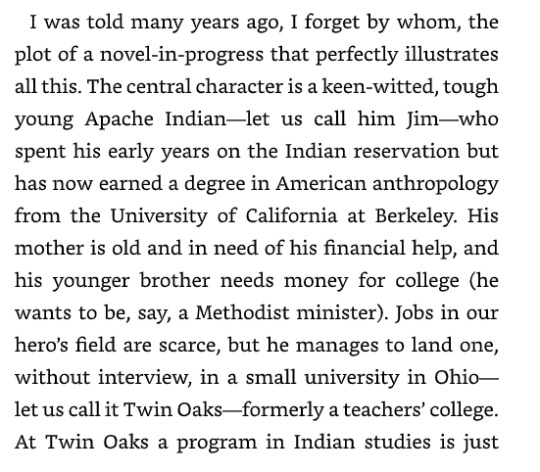
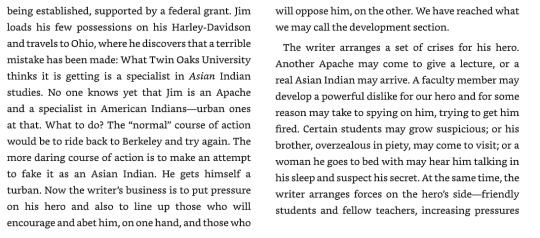
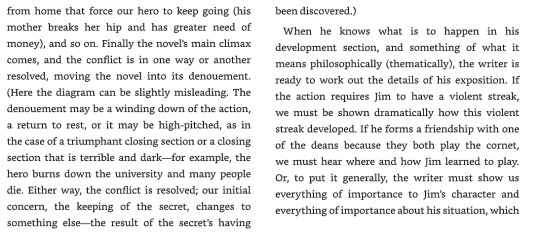
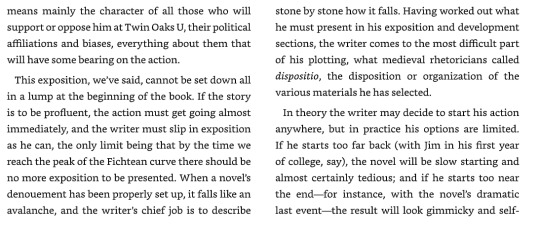
This is around page 205-206
This is an argument for white people being required to read PoC fiction in the worst way possible. Should I bring up bell hooks?
Mr. Gardner, sir, why the fuck would an Indigenous person want to be a Methodist Minister as an Apache living on a reservation? This is why it's called, you have to research your ideas before you publish them into a book.
But wait, it gets worse from there... somehow. You see, Gardner didn't do research and so thinks Berkeley in the 1980's didn't have a Native American program before he spit this out.

For the kids who can't math, that's ~1970's. I know, back in the day, no internet, but you can still give a phone call and make sure your spit balling isn't turning weird while you're trying to be inclusive.
It's pretty easy to switch majors especially within the social sciences field. And if the person according to him, majored in Anthropology, within the UC system, switching the specialization wouldn't be that difficult.
Yes, I know, it's just an example in a writing advice books, but after you read things like these authors promoting child marriage, genocide, and disparaging anyone not German, and being obviously racist when they were in the Holocaust, I'd say research your spit balling too. 'cause !@#$. The crap that they don't post on summary websites also matters. Highly matters. I really want to know if the guy was struck down because he caught too many pokemon I mean sided with the Delphian society which promoted the education of women, or he's being held up with his terminology but no one dares name him because he's a Jew that went through the Holocaust and somehow is racist towards Indigenous people and Blacks which makes no fucking sense. What was their value system and how doe that relate to their writing advice?
Because you can't mention Gustav Freytag without mentioning the fact is he was in favor of fascism before it existed, loved the idea of genocide, was a Christian, and equated his diagram to (male) sex. I mean, once you know that, then the whole diagram makes sense, no? It's not off-topic to know why he created it is because he thinks he's better than Shakespeare and thinks he can do better than Hamlet. (and yes, I'm going to make fun of this. And if I'm in Poland, spit on his grave and make fun of him. Oh, and if you're Polish, and see his grave, piss on it, because he wanted you dead. Sweet irony. Don't you love real life karma? I do.)
Positives and Negatives of the Book Overall
The biggest one I can think of, is that the section on how to plot a book is pretty nuanced for writers that were writing in that time period, though I'd have liked him to give attribution to those ideas more enthusiastically, especially since some of those ideas, in my own opinion, are often executed better by Black Authors or women than they are by cis men. For example, he floats something that looks like an uncooked version of thematic plotting. And for thematic plotting, I'd have pulled Jewish authors, maybe, Black authors definitely, Korean authors (if he had access) and some of the more thoughtful literature of the era from women. Even Tender Buttons tries very much to pull thematically at things.
But while he floats the ideas of how to plot, he doesn't go into the technicalities of the plotting itself, where he got the ideas from (For example, stealing from Rowe because he can't remember, which is hilarious to me.) And he doesn't go into maybe the effects it might have on the reader--I suppose it's harder to get that data in the early 1980's, but there should be a theoretical psychological framework at least starting. He doesn't ask WHY one would use a certain plot structure or technique, but instead how fun it is. I get this is for young readers, but even if you don't know, I think it's fun for younger readers to be asked and float ideas so they start thinking about how interactive reading and writing has to be.
It is interesting to note that while he does talk about conflict, he does occasionally float other things can also pour into characters to move them, such as emotions, discovery, etc.
And there is no language about stakes in here at all. I cannot find the words. So the idea of "High stakes narrative" does not exist in the early 1980's landscape yet. But by the late 1990's, it's everywhere. I'll do my best to find that author and give them credit, even if they are a shithead or if they turn out to be good. I want to give a sense of the landscape of how this thing came to be, even if I can't find that errant and missing author for the Antigone diagram.
For those who wish to write one of these writing books: Please don't put out the advice to consume fiction widely and really mean white straight cis abled men and patently show how much you fail at your own advice. Also, please, please understand that classics are made by readers, not by the writers and you won't fuck up Shakespeare and Aristotle half as much.
I swear, this does a toll on my mental health to read so many of these books and the men can't celebrate something like Anne of Green Gables as High Literature. I mean that opening sentence is just... uhhhhh... c'mon. It's free online. Read it. That opening line is clever and that's before they required hooking in literature as heavily as they do today.
6 notes
·
View notes
Text
A long passage from Sarah Schulman’s The Gentrification of the Mind: Witness to a Lost Imagination, concerning the anti-sexuality current in the mainstreaming of queer literature, and in particular a detailed account of the 1994 censorship case surrounding the Canadian Little Sisters bookstore.
I think it’s valuable not just for its description of the double-bind queer folks are put in when we’re asked to sanitize or disavow our own sexual realities in order to gain mainstream acceptance, but also for its glimpse into the mechanics of what exactly the process of implementing censorship criteria looks like—who has the power, who gets silenced, and how that can intersect with systems of oppression. All bolding mine.
The truth—that queer, sexually truthful literature is seen as pornographic, and is systematically kept out of the hands of most Americans, gay and straight—has been replaced with a false story of a nonexistent integration and a fantasized equality. […] In my own experience, the [mainstream] equation of queer literature with pornography is undeniable. […] Of course, in gay time, “recent” quickly disappears because so many participants are dead, and others have been silenced. It’s hard to have collective memory when so many who were “there” are not “here” to say what happened. Once the recent past is remembered, then the Amazon “glitch” [in which LGBT titles were automatically removed from Amazon’s listings during a porn purge in 2008] becomes all too consistent. So, here is just one example, exhumed from memory.
In 1994, a coalition of feminists and right-wing politicians in Canada passed a tariff code called Butler that was designed to restrict pornographic production. Instead, it was applied in such a way that it allowed officials at Canada customs to systematically detain and destroy gay and lesbian materials at the border. A gay bookstore in Vancouver, Little Sisters, had so much of its product seized that it could no longer operate. As a result, Little Sisters decided to sue the Canadian government.
My friend John Preston had just died of AIDS. He was the author of some iconic leather and S/M novels, many with literary bent. His novel Mister Benson had been serialized in Drummer magazine, and created a subcultural phenomena. Men would wear T-shirts asking Mister Benson? Or asserting Mister Benson! While he had a less explicit series called Franny, the Queen of Provincetown, John was perhaps best known for his book I Once Had a Master. Since he was newly dead, I was asked by the Little Sisters legal team to come to Vancouver and testify on John’s behalf. And because I was very clear in my opposition to state repression of gay materials, I had no problem agreeing.
The Canadian courthouse was quite shocking to this New Yorker. No metal detectors, no armed guards at rapt attention in every corner. The building looked like a Marriott hotel, with lovely plants, comfortable seating, and a coffee bar. But do not be fooled, the Canadian government proved to be a vicious animal with a demure exterior.
Tensions were high in the courtroom the day I arrived. The trial had been going on for weeks and many writers had testified. Patrick Califia, who at the time had presented as female with the name Pat, had been on the witness stand the Friday before and had done so well that the Crown had refused to cross-examine him. Interestingly, “Pat”—who was known as a butch leather dyke—had taken the extreme step of wearing a brown corduroy dress, which impressed me. We were, after all, trying to win. I, and I assume many of the women testifying, had agonized over what to wear on the stand. The only nice dress I owned in 1994 was black velvet—kind of a parody of a dress, and something to be worn to the opera. Anyway, I wore pants. Becky Ross, a Canadian academic, testified before me. She wore a dress, but I think she always wore a dress. Anyway, the Crown had been pretty hard on her, asking her to define “fisting.”
John’s books were being persecuted on five counts. The questions I had to address were: Is it violent? Is it degrading? Is it dehumanizing? Does hit have literary merit? Is it socially redeeming? If I had had my way, I would have argued that even if the books were violent, degrading, et cetera, they still should be available. However, Canadian courts had already ruled on that question, so my only remaining strategy for protecting his books was to “prove” that Butler should not be applied to him. Not that the law was wrong.
So many years later, this is the conundrum gay writers faced with the Amazon exclusion. Mark Doty, Larry Kramer, and many other principled gay writers noted online and in print that books like Giovanni’s Room and Oranges Are Not the Only Fruit were being falsely labeled as pornography. Once again we were forced by a state or corporate apparatus to claim that our literature was different from that dirty stuff, instead of part and parcel with it. But it is the homosexuality that got the books marginalized in the first place. Not their sentence structure.
[…]
The actual testifying did not go that well. Once I got on the witness stand, the Crown claimed that I was not qualified to be an expert on “harm.” I said that as someone who has experienced “harm” for being a lesbian, and especially for being a lesbian writer, I was quite expert on the matter. I argued that “homophobia is a social pathology that causes violence and destroys families.” I said that gay and lesbian books are a mitigating force against homophobia and therefore are socially beneficial and the opposite of “harm.” The Crown claimed that I was not qualified to make this statement because I am not a sociologist. They won, and I was forbidden from addressing that issue in court.
This was the first indication I had of our judge’s conceptual limits. As we moved along, I came to learn that Milord did not know what “deconstruction” meant. And later he revealed a puzzlement over the meaning of the word “enema.” Oh no, I thought. If he has never heard of enemas or deconstruction, we are doomed.
The Crown read out loud a passage from one of John’s books describing nipple torture. It was a bit surreal. Then he asked me if this was “degrading or dehumanizing.” I did my best.
Through the rest of the trial the government repeatedly made clear their view about any gay sex. They had seized a lesbian anthology called Bushfire because it included the line “she held me tightly like a rope,” which they said was “bondage.” They had also seized a book called Stroke, which was about boating.
In the end, after many more years and courts and dollars, Little Sister lost their case. The judge ruled that Canada customs officials had, and still have, the right to decide which materials are not suitable to come into the country. Interestingly, they quickly ratified gay marriage, while continuing to retain the right to insure that no married gay man will ever go looking for Mister Benson.
Those two days in court made it crystal clear to me that in the minds of many people, homosexuality is inherently pornographic. And there is nothing that has occurred in the subsequent three presidential terms that has created any other kind of context. The best proof is in our contemporary placement and treatment of sexually truthful gay literature. That John Preston was invited to give a keynote address at Outwrite, the now defunct lesbian and gay writer’s conference, was a sign of the prominent and central role of sexually explicit content in gay literature when it was controlled by the community. Now that gay presses and bookstores have been gentrified out of existence, first by chain stores like Barnes and Nobles, which are now being outsold by Amazon.com, gay literature is at the mercy of the mainstream. […] This puts gentrified queer people in a terrible bind: we can dissociate ourselves from the full continuum of queer literature, that is, from queer sexuality, thereby falsely describing our literature as “quality” if its sexual content is acceptable to straights. But that is a kind of implicit agreement that we only become deserving of rights when presenting as somewhere between furtive and monogamous.
3K notes
·
View notes
Text
NO ONE knows how to use thou/thee/thy/thine and i need to see that change if ur going to keep making “talking like a medieval peasant” jokes. /lh
They play the same roles as I/me/my/mine. In modern english, we use “you” for both the subject and the direct object/object of preposition/etc, so it’s difficult to compare “thou” to “you”.
So the trick is this: if you are trying to turn something Olde, first turn every “you” into first-person and then replace it like so:
“I” → “thou”
“Me” → “thee”
“My” → “thy”
“Mine” → “thine”
Let’s suppose we had the sentences “You have a cow. He gave it to you. It is your cow. The cow is yours”.
We could first imagine it in the first person-
“I have a cow. He gave it to me. It is my cow. The cow is mine”.
And then replace it-
“Thou hast a cow. He gave it to thee. It is thy cow. The cow is thine.”
57K notes
·
View notes
Text
i’ve been doing my homework on how to break into a writing career and honestly. there’s a Lot that i didn’t know about thats critical to a writing career in this day and age, and on the one hand, its understandable because we’re experiencing a massive cultural shift, but on the other hand, writers who do not have formal training in school or don’t have the connections to learn more via social osmosis end up extremely out of loop and working at a disadvantage.
162K notes
·
View notes
Text
Greek mythology media (1)
To begin this overview of Greek mythology in media, I originally wanted to start with some of the most famous American pieces of fiction - those that shaped, for the better and for the worse, the "Americanized" perception of Greek mythology... Including Disney's Hercules.
However after some thought, I think I need to cover something else beforehand... What I like to call the "Hercules saga".
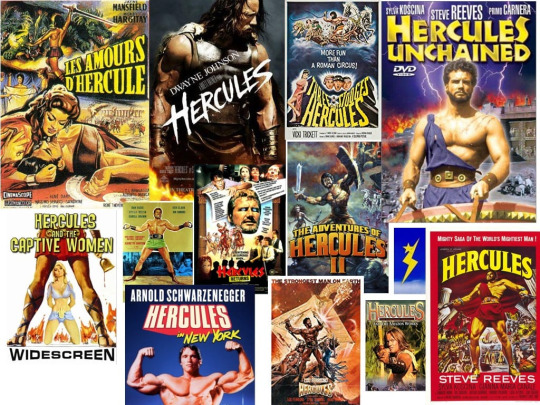
(Picture courtesy of greekgodsparadise.com)
Have you ever wondered why Disney made a movie about Herakles and yet named him "Hercules"? Why would Disney commit such a blatant mistake, using the Roman name of the hero despite everything else being (vaguely) Greek-inspired? Because Roman mythology is better known than the Greek (see my Medusa posts)? Not exclusively...
The reason why Disney made a movie named "Hercules" instead of "Herakles" was because their animated piece was very obviously a follow-up of an entire GENERATION of movies based on the figure of Herakles, but being sold, publicized and shared with the name "Hercules". Beyond this "mistake of Disney" is actually an entire generation of cinema history that people today completely forgot about, and that explansi why, of all the Greek myths, the one of Herakles is supposedly the one with the most movies attached to it...
I/ The beginning of it all
To start this deep dive we need to begin with the movie that started it all. The 1958 "Hercules" movie - at least it was its English title. Its original title was "The Labors/Trials of Hercules", "Le fatiche di Ercole". For yes, this movie was an Italian production (with some Spanish and French collaborations).
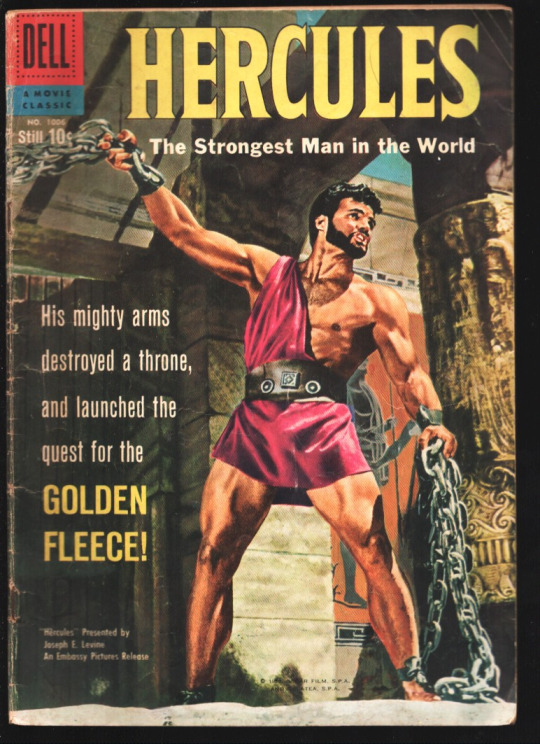
This movie's story is... quite more confusing than you would expect. Yes, the title is correct: Hercules is the main hero of the story. This being an Italian production, all the names were taken from Roman mythology rather than Greek - Hercules, Jupiter, Venus... And this is precisely why the name Hercules would go on to become so famous, but that's for later. However, despite what the title hints, this story isn't about the Twelve Labors of Herakles. Two of these trials appear in the first third of the story: the Nemean Lion and the Cretan Bull. However, the actual literary work of Antiquity this movie is based on is... the Argonautica of Apollonios of Rhodes. Yes, this movie is also about Jason, and the Argonauts, and the quest for the Golden Fleece, but with Jason being only a secondary character. In fact, most of the Argonauts's adventures aren't even told since the actual quest for the Golden fleece is massively reduced, with a good quarter of the movie entirely dedicated to the Argonauts' stay on the island of the Amazons... So this movie is a bit of everything. A bit of Herakles but not too much, a bit of Argonauts but not too much - though there's a LOT of the Amazons...
Fun fact: the lighting and the special effects were done by Mario Bava, who would later become of the iconic names of horror in Italy.
The movie being in public domain, you can find it pretty easily online, and having watched it, what is my opinion? Well... On one side the movie definitively aged badly. Many elements of it at now laughable today. The main love interest's costume is to the toga what the bikini-chainmail is to an armor, and her obviously modern makeup is very distracting. The fights of Hercules with the Nemean Lion and the Cretan Bull very obviously involve him punching fluffy puppets. Somehow a very modern fountain sitting by an ancient Greece palace... Ominous storm clouds are just a mud-stain on the camera's lense in an otherwise clear blue sky. Of course when the Amazons arrive the camera focuses twice on their naked legs ; and their cemetery is properly hilarious. The adorable Nemean Lion forgets he is supposed to play dead and shouldn't blink one he is "strangled". Oh yes, and there is also a VERY racist moment during the arrival in Colchides, where our heroes are faced with what is supposed to be primitive, savage, cavemen-like people... But who are in effect just black men wearing furs, a few prosthetics, and making monkey sounds. Very racist.
One of the things with this movie is that there is also several versions of it going around. We are lucky to have the cinematic, clean and properly-dubbed version on Youtube for free - right here ; but you will also find around the Internet versions of a much poorer quality which were designed for television airing, and which have a different English dub. Such a version can be found here for example. And then you apparently have yet a third version somewhere with yet a third dub that makes pretty big flaws (such as changing Hercules' entire rant to the oracle/sybil about immortality into a rant about "strength" which changes the entire idea of the movie). That's one of the evils of the public domain: re-dubs are everywhere.

Now all that being said... While this movie has definitively aged, I can still see why it became one of the classics of mid-20th century cinema, and why it caused such a big reaction upon its release.
Some of the ideas and concepts brought up are very interesting - for example weaving an entire motif of "revenge is not the answer" in a story where both Hercules has to bent to the unfair treatment of a king, and Jason has to find the murderer of his father. The treatment of the characters can also be interesting - from an Hercules who actually seeks humanity instead of immortality, and has to live in a world where his divine powers are actually freaking out people and shunning him as a monster ; to a king Pelias that is not actually actively evil or cartoonishly malevolent, but rather a fearful, suspicious and worn-out man who still does evil things out of anger, cowardice and bad advice, but who has been exhausted and burdened by guilt and regret to the point he enters the story only wishing to give up the throne and die... There is also a fascinating angle where the movie insists on the fact that Hercules is just as much intelligence as strength - for example with a wonderful scene of him proving even an average human person can shoot incredibly well arrows without a divine strength, but just good advice and observation of the environment and a well-formed technique... that ends with the big twist that those excellent bow-lessons he gave to the "random boy" he selected where given to ULYSSES out of all people. Yep, we have a movie where Herakles was Odysseus' mentor...
Mind you, while there are great ideas and concepts which make the movie stand on its own, in terms of mythological adaptation it is very poor, because as I said it mixes together edulcorated and scrawny versions of the myth. You've got two of the 12 labors done in a very different context. You've got a brand new Hercules characterization that doesn't touch upon his actual legends. You've got a Jason and the Argonauts story without sirens, Medea or giant ship-crushing rocks, and where Jason is just a background character. This "mixed" nature extends to the very tone and focus of the movie. It is a rich movie, no doubt, that blends and mixes the genres - but while it is precisely its charm (you are never bored with it), it is also what causes it to feel a bit unfocused. It starts with the naive and cliche romance between Hercules and a princess, leading to the angsty "I don't want to be immortal" scene of Hercules... It continues in what is basically a Gothic story about a strange and dysfunctional family burdened by the dark mystery shrouding a past crime that still haunts the present, and who lives in a half-abandoned palace where a ghostly murderer and treacherous whisperer haunts the shadows... We then cut to what is basically a PSA for athletism and sports, and then we delve into your typica adventure-movie alternating comic book humor with fights against monsters ; and then we have an entire mini-movie inside the movie at the Amazons island which unfolds as a romantic tragedy... This movie has everything, and perhaps a bit too much of everything, and feels like four different movies crammed together in one.
The other big "good point" of this movie is DEFINITIVELY the visuals. This movie allows me touch upon what was one of the big qualities of the good mythological movies of the mid 20th century: they truly knew how to make visual delights. The opening visual of a sheperd playing a Pan's flute while being listened to by his goats? The oracle all shrouded in a black veil suddenly revealing a blood-red dress? The three royal children going to the throne room - only for the two actual innocents one to be fascinated by the Golden Fleece while the brat immediately sits on the throne? Hercules climbing a shadowy mountain towards the red-lit temple of the gods? The visual of the Golden Fleece hanging from its tree, above a mount of dead leaves that turn out to be the asleep dragon? There are so many parts of these movies that just speak so much with just the sights. And it isn't just the sights, but some details in this movie are particularly head-turning. Ranging from the subtle - Hercules and the oracle locking gaze upon first meeting, and not saying anything but clearly showing a link because they are two beings of the world of the gods recognizing each other, and are thus set apart from the other humans in the room... To the more obvious: this movie had the genius idea to decide that the dragons of Ancient Greece were actually just FRIGGIN DINOSAURS that the gods somehow protected from extinction X)
II/ Omphale comes on stage
1958's Hercules was a HUGE success in Italy - and by extension in most of Europe. It was such a huge success that its director, Pietro Francisci, released the VERY NEXT YEAR the sequel, known in English as "Hercules Unchained". A quite silly title given the "unchained" part refers to a segment of the original 1958 movie. The actual title of this movie is "Ercole e la regina di Lidia", "Hercules and the queen of Lydia". For this movie, Francisci took the same team: Mario Bava for the special effects, Steve Reeves to play Hercules (he had been selected for the first movie because he had freshly won the title of Mister Universe - in fact, people did note that due to lacking an acting background he was quite stiff and unnatural in the first movie).

Many people at the time - including Howard Hughues himself - considered that this movie was a better one than the original, with enhanced acting, a much more "punchy" writing, more convincing action scenes, as well as very impressive baroque sets (which, fun fact, had been heavily inspired by the art of Flash Gordon). But the same audiences and critics of the time recognized a structural flaw in the piece, saying the various elements and tones were unbaIanced and that the movie felt as if it continued dozens of minutes after its plot actually ended. I... kind of disagree?
Just like the original movie mixed together the legends of Herakles' labors with the Argonauts' journey, this movie tries to tie together Herakles' time at Omphale's palace and the "Seven against Thebes" events, aka the battle between Eteocles and Polynices for the throne of Oedipus their father. I have to say I much prefer the first movie somehow, perhaps because it was a bit simpler? This piece is even less faithful to the Greek mythology material (which wasn't hard given the first movie was already a very loose adaptation), and in fact here we really feel the "sword and sandal" flavor. As in, this movie bears more common points with your typical sword-and-sorcery or heroic-fantasy short story/novella than with Ancient Greek epics or theater plays. Though the latter point is to be nuanced, because this movie is VERY theatrical. It is very staged, very visual, very dramatic - and perhaps too much because in many scenes the dramatic overcomes just basic logic or common sense (Hercules' repeated "arms up while invoking the gods" scenes do get ridiculous), and while some scenes are impressive, they do feel like someone filmed a stage-play rather than a movie. Let's not talk of an even greater fantasmagoria when it comes to the setting (the usurper of Thebes has Roman "pit of tigers"-type of gladiator plays, while the queen of Lydia who works with Egyptians and has an Egyptian-decored lair, organizes "Arabian Nights"-like dances and wears definitively 20th century fashion dresses... My last grief would be that this movie is actually repeating its predecessor (Omphale's palace being the island of the Amazons, the final fight being identical to the one of the previous movie), though it does bring to the table some new elements that are quite charming (Ulysses grows on me here as we see him growing into his trickster self, while being a plucky, comical young clever sidekick ; and the fountain of the "Water of Oblivion", aka a non-trademarked Lethe, is a great set piece).
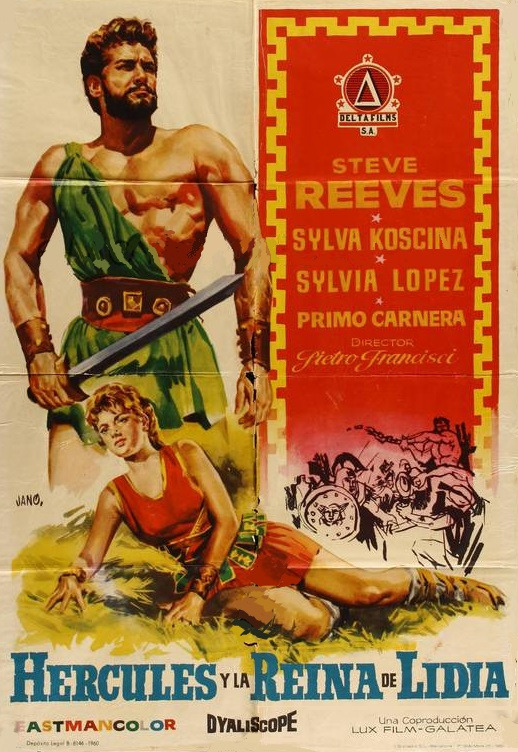
But no matter what I may think of it, this movie was still an even bigger success than its predecessor, to the point it made its producing company, the studio Galatea, one of the biggest movie companies of all of Italy. Unfortunately, it also was the end of the "original" Hercules movie series. The producer of the two first pieces, Lionello Santi, part of the Galatea studio, decided at the surprise of everyone to abandon the newborn ad successful franchise. He entrusted it to a certain Achille Piazzi, who decided to name as a new director for the third Hercules movie Vittorio Coffatavi, pushing Pietro Francisci away. Since Steve Reeves only wanted to work for Francisci and no one else, the actor of Hercules was also replaced, by Lou Degni - better known by his stage name, Mark Forest. And finally, "Hercules Unchained" marked the end of the Francisci-Bava collaboration. For you see, Mario Bava did even more work and poured even more effort (or so he claims) into "Hercules Unchained" than into the original "Hercules" , to the point he asked to be designated as a co-director in the movie's credits. But Francisci refused, claiming Bava hadn't done so much work as he claimed: Francisci insisted "Hercules Unchained" was his piece before all things, and that Bava just wanted to take credit for his work, and refused to change Bava's function in the official rolling credits. This battle led up to the two of them not working together anymore.
III/ Hercules becomes... Goliath?
The result of all these changes was a third Hercules movie release in 1960, called... "Goliath and the Dragon"?
This third movie's actual title is "Hercules' Revenge", "La vendetta di Ercole". However, the American distributors changed it to "Goliath and the Dragon" because they needed to make this movie a sequel to an earlier success, the Franco-Italian movie "Goliath and the Barbarians". Which... isn't even a movie about Goliath, but rather a historical movie about a guy named Emiliano in the 6th century... Ah those wacky American distributors, back at their hijinks...
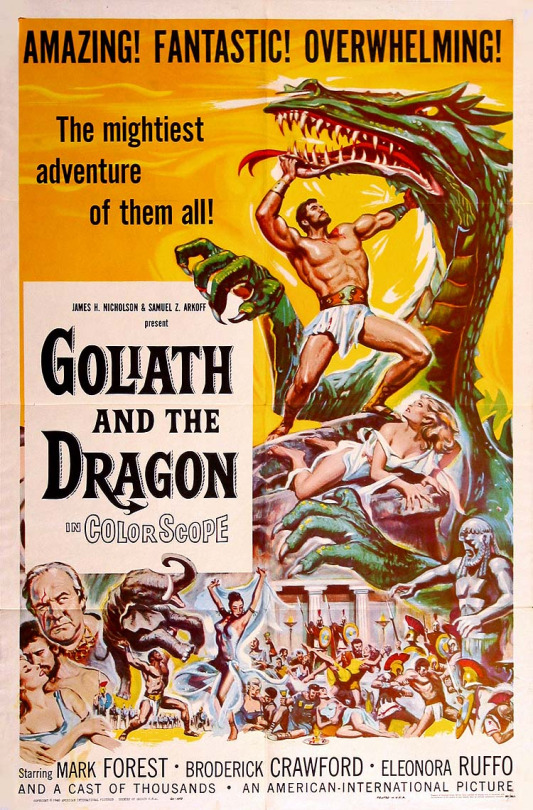
New director, new actor, new team... But also new scenario! Indeed, with this movie we have a fresh start, and a return to a more accurate depiction of Greek mythology... Well kind of. They kept numerous elements of the old movies, but brought in many more from the old Greek legends - the Twelve Labours for example (that Hercules finishes at the beginning of the movie with the taming of Cerberus), or his wife Dejanira. The story in itself, while trying to be more "Greek myth-flavored", is still a unique story mixing elements from various other tales. Hercules' son (turned into Goliath's brother in the American dub) is in love with Thea, who is unfortunately the daughter of a wicked king that wants to take the control of Thebes, Hercules' city. At first it seems the story will be just about the various manipulations and schemes of the wicked king and his allies to try to get rid of Hercules (for example making his son believe he wants to take Thea for his own, and using treacherous messengers to try to convince the poor boy to poison his father without realizing what he is doing) ; but then the third/fourth act of the movie completely takes us into a different direction, as now a prophecy by the gods overlaps with the conflict against the wicked king and... Its a bit convoluted.
I kind of skimmed through the movie because by now the "sequelitis" had started to really kick in. I will admit two good points for this piece: one they attempt to return to more mythologically faithful material, and even though they tell a new story they try to keep Greek elements in it (impossible love triangle between a son and a father, betrayals and tragic deaths within a same family, a hero going up against a wicked usurper king, prophecies the hero will try to fight against...). These efforts are unfortunately completely ruined by the American dub which changes the nature of everything. The second positive point would be the final part of the movie - when we leave the simple "romantic drama and political treacheries and other Shakespearian schemes" to enter the "let's fight a prophecy" domain. Hercules receives a prophecy that his son will take over the throne of the wicked king... in exchange for the life of "the woman who loves Hercules" (interpreted as his wife, Dejanira). As a result, the entire family of Hercules will struggle against this prophecy and try to avoid it - from Hercules becoming obsessively protective of his wife, to his son growing suicidal to protect his mother ; and here we really go into a much more emotional and human side of the story. We even have Hercules turning against the gods for this prophecy - despite having just finally cleared up his curse and made peace with them after his Labours, he still can't accept having his family doomed like that - going for the help of an oracle only for her to get KILLED when she disobeys the gods to bring him aid ; and it comes to Hercules being forced to make a heroic sacrifice, destroying his life to save others... There's really something more unique and touching in all that, that also reasonates well with Greek myths.
All that being said: the bad points. The Hercules movie of the era grew by the 70s and 80s to be synonymous with "hilarious kitsch comedy". Nobody could take them seriously anymore - and this movie really shows why. The first two Hercules pieces have laughable elements - but many were intended as light-hearted comedy, and the others still leave room for the seriousness of the piece. But here? Nah. On one side you have the special effects that aged very, very badly - resulting in the goofiest dragon and most ridiculous Cerberus battle you will ever see and the cheapest lightning effect ever made. And if the bad special effects weren't enough, you also have the American dub that changes the whole stories and tries its harder to rewrite the Greek myth into a more generic-fantasy things (while also fitting to a previous unrelated movie), resulting in a plotline even MORE convoluted than what it already was... This movie can be fun to watch just to see how ridiculous it all got, and unfortunately the most serious and interesting parts only come to us after bunch and bunch of cliches, convoluted writing, very bad dialogues (like REALLY bad) and papier-mache monsters.
[As a quick note here, this movie was also a step-up in the genre when it comes to the supernatural. You see, the first two movies actually had a more... let's say "realistic" approach to the magical elements of mythology. The gods and the supernatural was definitively real, but the movies made sure to frame it in a quite "realistic" light. The gods themselves never appear, and only speak through oracles or manifest through sudden changes in the weather. The monsters our hero fights are all just regular animals (a lion, a bull - well a bison they try to pass off as a bull), and even the "strange land of Colchides filled with wonders" is framed realistically as a sort of patch of land where prehistoric times continued on untouched (with the "monsters" there being just cavemen/Prehistoric men ; and the "dragon" being a dinosaur). And from the realm of the divine we have people with clearly supernatural abilities (Hercules with his immense strength, the oracles able to predict the future), but they still look like ordinary people... This all served the purpose of conveying the fantasy of the myths while working within limitations of budget and special effects.
This movie decided to actually bring the fantasy to screen by having actual monsters, and having the oracle fade in and out like a ghost, and a centaur turning into a satyr, and having the gods speak directly to the heroes or shooting lightning bolts at those they dislike... But as I said those special effects aged very, very poorly, and it is precisely by trying to do a "big show" that they actually ruined this strange worldbuilding-charm that worked so fine for the first two movies. "Showing less does more", as they say.]
IV/ Hercules against... vampires?
While Francisci and Bava never worked together again, both returned to the making of Hercules movies later on, each on their own.
Francisci released in 1963 a movie called "Hercules, Samson and Ulysses" (in its original title "Ercola sfida Sansone"), taking back the duo of Hercules and his sidekick Ulysses from the original movies, and having them confront the Biblical Samson... But given we are entering mythological crossovers, I will not be looking at this movie in any more details.
As for Mario Bava, in 1961 he released a movie co-made with Francesco Prosperi (and with Western Germany), "Ercole al centro della terra" - Hercules at the center of the earth. In America it was released as "Hercules in the Haunted World", but in many European countries, includng France, this piece's title was... "Hercules against the vampires". Why? Simply put: because the main villain is played by none other than Christopher Lee, and he plays a character with similarities to Dracula... As a result advertisers decided putting a big "vampire" stamp on this movie would work, despite it having no actual vampire.

The story is simple: Hercules returns to his home in Italy (remember we are still in a Greco-Roman mythology setting) after a war, only to discover his fiancée Dejanira (or Deianira as you English people like to call her) has fallen into an unexplained state of madness... An oracle tells Hercules the only way to save her is a magical stone from the realm of Hades. Hercules and his friend Theseus descend into the Underworld, unaware that Dejanira' caring uncle (Christopher Lee) is actually the one who caused her madness, and an evil sorcerer conspiring with the forces of evil to conquer the world...
Unlike the previous movie, "Hercules in the Haunted World/Hercules at the Center of the Earth" is much more of a "must watch" - or rather of a far better quality than its predecessors. We return to the charm and power of the earlier Hercules movie, but are then taken into a completely different direction thanks to Bava being able to truly make a movie of his own, with all the experience he gathered since the first Hercules. While the story veer into a much more... "fantasy" tone and plot, it is still a definitively "Greek mythology-inspired" type of fantasy, as elements of the legends of both Herakles and Theseus abond (descending into the Underworld, Deianira, the Hesperides and their golden apple, Procrustes and other of the bandits/threats Theseus had to face during his journeys...). Mind you, it is not because the Greek mythology elements and influence are everywhere that this movie is faithful to the legends, oh no, great liberties are taken here... Medea is now an oracle for the gods, Pluto becomes an evil god, you have references to Dante's Inferno while travelling through Hades, the Hesperides become daughters of Helios cursed by Pluto and entrapped in a land of endless midnight... This is definitively not a class about Greek mythology.
But the real strength of this movie, its real greatness (beyond Christopher Lee's presence, because come on, every Christopher Lee scene is great), is its visuals. This movie is a visual delight. Bava really used all of his tricks as a lighting and special effects guy - despite the movie having a not so big budget, Bava managed to created a gigantic fantasmagoria and epic sets and deeply oniric scenes simply through the use of colors, ciaroscuro, optical illusions, set design, and the power of not doing too much. In many ways this movie is the complete reverse of "Goliath and the Dragon": the "Goliath" movie tried to have these big impressive special effects but just became a cheesy, badly-aged kitsch piece ; while the Mario Bava movie is deeply otherwordly and haunting despite a quite limited budget and not doing "too much". (Mind you, not all things aged well, for example Procrustes' costume aged a lot, but the scene of Hercules climbing the giant tree of the Hesperides for example is wonderful).
Another slight flaw I would point out is that they have a very annoying "comical relief sidekick character" that... literaly serves no real purpose and I don't know why he is here, and he kind of ruins the mood (except for maybe one good joke). But this is definitively a movie to WATCH (not obviously appreciate, but just watch) - and it is disponible freely on Youtube in HD if you ever want to watch it. This movie, in fact, caused a brief wave of "creepy peplum" movies, a sort of... sub-genre crossing the "sword and sandal" with elements of horror movies (the "trio" of these morbid peplum movies tend to include Riccardo Fera's "Maciste in Hell" (The Witch's Curse, by American title), and Corbucci & Gentilomo "Maciste against the ghost/Goliath and the vampires/Maciste contro il vampiro".
What else to say... This Hercules was played by Reg Park, who would become the mentor of Arnold Schwarzenegger, who himself would later play Hercules. And oh yes, as a side note here: I haven't talked about this before in detail, but a departure from the Greek mythology is that in all those movies, and it is a common link between all of them, the character of Hercules is not a mortal who after death becomes a god, but the reverse. A great deal and great stress is placed on the fact that Hercules is an immortal among mortals, and a "god among men", and many times you will see or hear Hercules deciding to renounce his immortality or use his immortality as a bargaining chip... This builds an entirely different character, and a sort of meta-continuity for the cinematic incarnation of Hercules that neatly separates him from his mythical counterpart.
V/ The importance of the Hercules saga, and why it shaped Disney's Hercules
So... four movies (plus one mentioned). I said that the 1958 Hercules movie had been a huge success not just in Italy but in Europe as a whole. What I however did not say, because I wanted to keep it more of a surprise, is that this movie was an ENORMOUS success in the USA. Probably much bigger than you think.
The first two movies, "Hercules" and "Hercules Unchained" as they were named in English, were bought, translated and transported to the USA by Joseph E. Levine. Levine poured a LOT of money into a very aggressive and intense advertisement campaign to promote those movies, which not only were everywhere in theaters, but also aired on television. And this all resulted in a massive success, which gave Levine an entryway to build a big career in the movie industry, and the Hercules movies a lasting fame up until the 70s. By the mid-70s their fame and success slowly died out, from the tastes changing (making these pieces look ridiculous by modern audiences) to the television-copies of the movies being of very poor quality and badly preserved. By the 80s, these movies were a laughingstock, and the original duo of "Hercules" and "Hercules Unchained" even got a full-on parody in 1997. The two movies were recut into one, a whole new comical dub was made, and this resulted in "Hercules Recycled", about a TV exercise show-host who battles dinosaurs, fast-food obsessed mutants and insurance salesmen to save Earth by retrieving a secret formula inscribed onto a golden bath-mat...
But another one of the reasons the "Hercules" movies ended up being rejected and mocked mercilessly was oversaturation.
When people saw that "Hercules" and "Hercules Unchained" were HUGE successes both in Europe and America... The hunt was open, and it was free market for all. Everybody tried to recreate the movies, everybody tried making sequels of the movies, everybody did blatant rip-offs of the movies... In Italy at least, which was where the whole craze took place. It was the era of the "mythological peplum", of the "sword-and-sandal", of the "muscle-opera". During the 60s, around TWO HUNDRED movies based on the same principles, cliches and formulas were made for European and American audiences: movies taking place in a vague and unclear Antiquty, inspired by Greco-Roman mythology or Biblical stories, with a very muscular, oily, barely-dressed bodybuilder playing the hero, and him punching his way through soldiers and bandits and monsters, while trying to win the heart of a beautiful princess (or avoiding the deadly charm of wicked queens and enchantresses) - and with sometimes a plucky sidekick or comical relief by his side. Many were the protagonists of these tales, but ultimately they were all avatars of the same archetype: Hercules, Samson, Goliath, Ursus, Maciste were all replacable with each other.
Such an intense and fast mass-production of course brought the early death of the genre, that became "out" just as fast as it was "in"... Before it was replaced by the new cinematic craze coming from Italy and imported to the USA: the "western spaghetti", star of the 70s.
But this era left a deep mark onto America (and Europe too). In America, they were the reasons why the name "Hercules" became more famous than "Herakles". These movies were a prolongation of the bodybuilding trend, and of the athletic culture and body-worship and sport craze that had been started by the Mister Universe contest and the Charles Atlas celebrity. And - more interestingly perhaps for this website - these movies were also very influential and appreciated by homosexual communities of the 60s and 70s... I mean you literaly had muscular hunks bare-chested, oily and sometimes almost entirely naked, wrestling constantly with other half-dressed men, and surrounded by pretty girls and erotic sex-icons and pin-ups, who wore the toga-equivalent of the "chainmail bikini" of Conan fantasies... These movies were bound to attract gays and lesbians of their time.
There is a LOT of those Italian Hercules movies in the 60s, like a LOT. I can't possibly cover them all, but I will leave here the titles of some I will definitively not talk about (due to not being "Greek mythology" enough for my taste): 1961's "Sansone"/"Samson against Hercules" ; 1962's "La furie di Ercole" (The fury of Hercules) ; 1963 "Ercole contro Moloch" (Hercules against Moloch), 1964's "Ercole contro Roma" (Hercules against Rome), 1964's "Il trionfo di Ercole" (Hercules' Triumph), 1964's "Hercules against the sons of the sun", 1964's "Ercole, Sansone, Maciste e Ursus gli invincibili", 1964's "Hercules against the tyrants of Babylon"...
And even by leaving out those eight movies, with the five others I described before, I have still left, in the span of the Italian 60s, SIX more movies I could possibly talk about... As I said, we know around 200 movies were released during this decade in Italy - though hopefully for us, all the lesser and cheap ones faded into obscurity...
29 notes
·
View notes